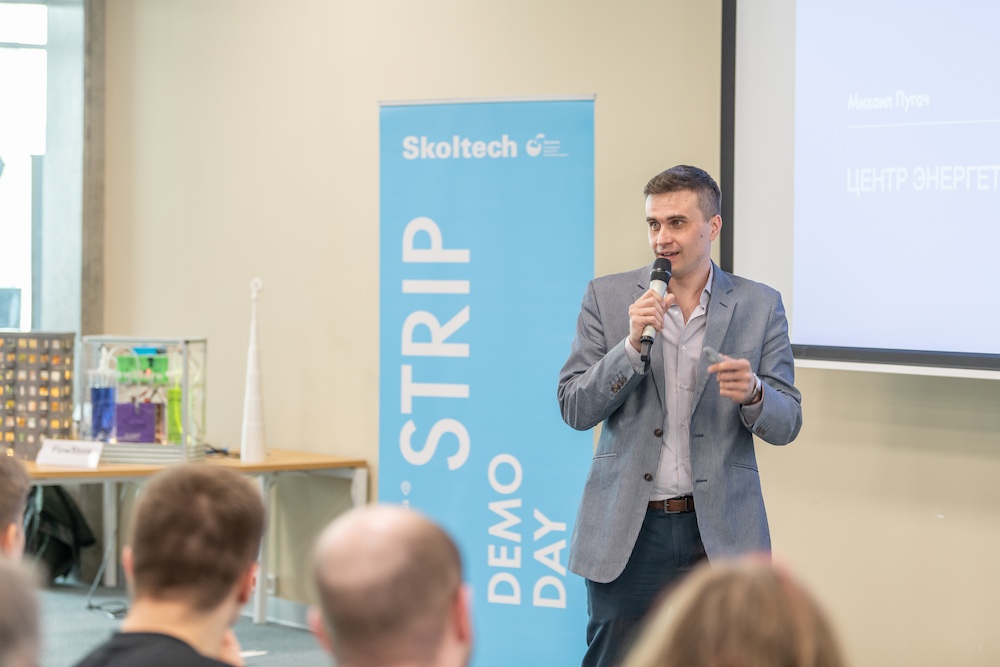On March 28, 2024, the Skoltech Translational Research and Innovation Program of the 2023/2024 round held Demo Day of the projects. The program seeks to support Skoltech teams with scientific and technological ideas that are relevant to the market.
Demo Day is a presentation to Russian experts, industrial partners, and investors of the program’s projects based on the first-year results.
Nine teams presented the results of their work, further project development strategies, and demonstrated the developed products.
- Modular robotic platform for modern greenhouses
The project pioneered an advanced robotic platform for monitoring greenhouses with a computer vision system.
- High-energy lithium-ion batteries based on modern single-crystal Ni-enriched nickel-manganese-cobalt cathode materials
The project aims to scale up the production technology and bring to market cathode materials based on layered nickel, manganese, and cobalt oxides in the form of monocrystalline particles for next-generation lithium-ion batteries. The target markets involve manufacturers of such batteries for electric vehicles, unmanned aerial vehicles, and portable electronics.
- HyperDog.AI: An intelligent four-legged robot for interacting with the environment
The project introduces an AI-driven platform for quadrupeds — HyperDog.AI — to overcome rough and dense terrain using the SLAM method and a deep learning approach. It also develops simultaneous localization and mapping (SLAM) algorithms and Deep Q reinforcement learning for navigation and path planning in industrial environments, as well as a HyperDog digital twin in the Gazebo simulation environment.
- EASY: Agro platform for accurate yield forecasting
The agro platform was created to help agricultural holdings and farmers improve the condition of crops and yields, while simultaneously allowing them to cope with the effects of climate change. Using advanced analytics and machine learning algorithms, EASY provides farmers with accurate yield forecasts, enabling them to make decisions based on data about their crops, and also optimize yields. With EASY, farmers will be able to easily predict and visualize data from various sources, including remote sensing data, weather conditions, and crop models.
- FlowStore: Vanadium flow batteries
The project develops vanadium flow batteries based on materials available in Russia. The product will be presented in the form of a laboratory-scale cell that can be connected to tanks and pumps and used to charge and discharge vanadium electrolytes using an external charger or load.
- Supercapacitors for electric motorcycles
The team is working on a hybrid energy storage system with advanced control of choosing a battery or supercapacitor as the main energy source in electric motorcycles to provide full power at any state of battery charge.
- SLADKEY: Sweet protein as the best alternative to sugar substitutes
The project aims to develop a brazzein sweet protein with increased sweetness and thermal stability as the best alternative to traditional sweeteners. It has a zero glycemic index, low calorie content, and a neutral sweet taste similar to the usual sugar. One gram of sweet protein replaces 22.5 kilograms of sugar.
- Spheroid Revolution: 3D bioprinting software for modeling scaffolds
Spheroid Revolution focuses on the development of 3D bioprinting software for modeling scaffolds for the production of bioprinted tissues and organs. The team presented an application for modeling scaffolds for bioprinting, as well as a hardware and software complex for 3D printing scaffolds for institutes and companies in the field of biotechnology.
- Agency for Intelligent Measures
The team focuses on creating new measuring and testing facilities compatible with existing imported equipment based on the modular principle. The project strives to develop compact devices for mechanical and thermal effects on samples, vacuum portable equipment in SEM for electrochemical research, microfluidics, flow cells for tomography, X-ray nanotomography in SEM, and 3D profilometry.
Contact information:
Skoltech Communications
+7 (495) 280 14 81

